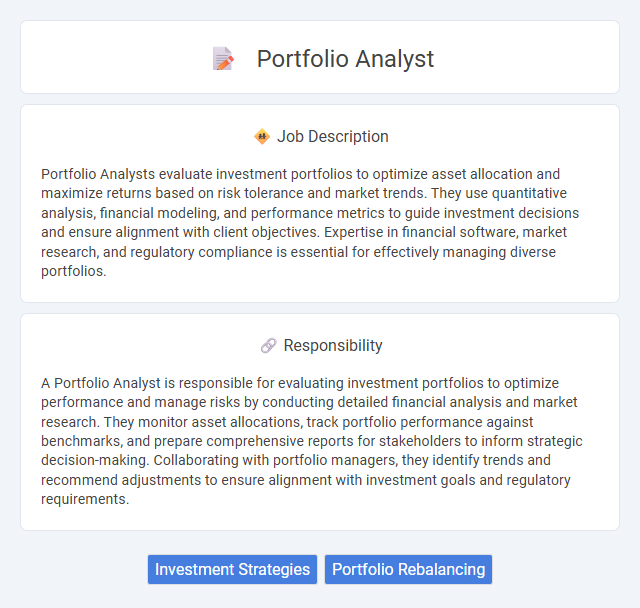
Portfolio Analysts evaluate investment portfolios to optimize asset allocation and maximize returns based on risk tolerance and market trends. They use quantitative analysis, financial modeling, and performance metrics to guide investment decisions and ensure alignment with client objectives. Expertise in financial software, market research, and regulatory compliance is essential for effectively managing diverse portfolios.
Individuals with strong analytical skills and a keen attention to detail are likely suitable for a Portfolio Analyst position, as the role demands thorough evaluation of financial data and market trends. Candidates comfortable with complex numerical information and capable of making data-driven decisions may find success in this field. Those lacking interest in finance or struggling with quantitative analysis might face challenges aligning with the job's requirements.
Qualification
Portfolio Analyst roles typically require a strong background in finance, economics, or business administration, often supported by a bachelor's degree in these fields. Proficiency in data analysis, financial modeling, and portfolio management software such as Bloomberg Terminal or Morningstar Direct is essential. Advanced qualifications like the CFA charter or a master's degree in finance enhance analytical skills and career prospects in this competitive field.
Responsibility
A Portfolio Analyst is responsible for evaluating investment portfolios to optimize performance and manage risks by conducting detailed financial analysis and market research. They monitor asset allocations, track portfolio performance against benchmarks, and prepare comprehensive reports for stakeholders to inform strategic decision-making. Collaborating with portfolio managers, they identify trends and recommend adjustments to ensure alignment with investment goals and regulatory requirements.
Benefit
A Portfolio Analyst likely enhances investment decision-making by providing detailed analysis and risk assessment, potentially increasing portfolio returns. Improved financial forecasting and strategic allocation might reduce losses and optimize asset performance. Employers and clients may benefit from data-driven insights that support more informed and confident investment strategies.
Challenge
Portfolio Analyst roles likely present the challenge of managing complex data sets to accurately assess investment performance and risk. Candidates probably need strong analytical skills to interpret market trends and provide actionable insights. The position might also demand adaptability to rapidly changing financial environments, requiring continuous learning and decision-making under pressure.
Career Advancement
A Portfolio Analyst monitors investment portfolios by analyzing market trends, asset performance, and risk factors to optimize returns. Expertise in financial modeling, data analytics, and portfolio management software enhances opportunities for advancement into senior analyst or portfolio manager roles. Continuous professional development and certifications such as CFA significantly improve prospects for leadership positions within asset management firms.
Key Terms
Investment Strategies
Portfolio Analysts specialize in evaluating and optimizing investment strategies to maximize returns while managing risk across diverse asset classes. They utilize quantitative models and financial analytics tools to monitor market trends, assess portfolio performance, and recommend asset allocation adjustments aligned with client objectives. Expertise in securities analysis, risk assessment, and portfolio diversification techniques is essential for effective investment decision-making.
Portfolio Rebalancing
Portfolio Analysts specialize in portfolio rebalancing to maintain optimal asset allocation aligned with investment goals and risk tolerance. They analyze market trends and portfolio performance data to determine necessary adjustments, ensuring diversification and minimizing risk. Using quantitative models and software tools, they execute timely buy or sell decisions to preserve portfolio efficiency and enhance returns.
 kuljobs.com
kuljobs.com